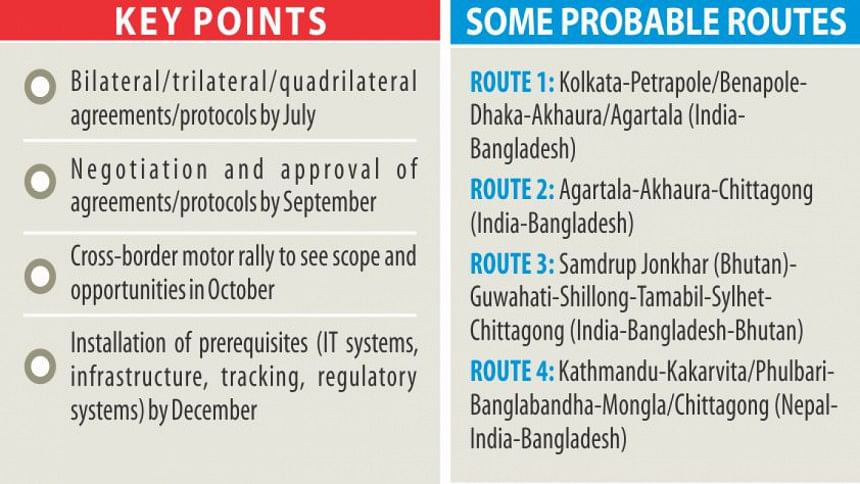4 nations to get linked by road

Bangladesh, Bhutan, India and Nepal have mapped out a six-month action plan starting in July to establish a seamless movement of passenger and cargo vehicles across their territories.
Transport ministers of the four countries, who signed a deal in Bhutanese capital Thimphu in this regard yesterday, identified 30 transport corridors to be transformed into economic corridors. This will potentially increase intraregional trade within South Asia by almost 60 percent and with the rest of the world by over 30 percent, according to a joint statement.
The infrastructures for the four-nation road connectivity would require an estimated $8 billion. Each government will be responsible for completing the infrastructures in its territory by its own fund with support from donor agencies.
Already, a number of these corridors, which also include bridges, have either been improved or are under construction.
The corridors, associated routes and their costs have been determined based on an analysis of patterns of regional and international trade. The analysis was done by the Asian Development Bank, which has been pushing for regional connectivity for the past several years.
All the necessary protocols and agreements -- bilateral, trilateral and quadrilateral -- and other prerequisites will be completed by December to introduce limited operation of vehicles through the available routes from early next year, said the statement.
"We have also discussed launching of a passenger bus service by the end of this year. We are planning to operate buses between Dhaka and Katmandu and Dhaka and Thimphu from November-December this year," Road Transport and Highways Division Secretary MAN Siddique told The Daily Star by phone from Thimphu.
Of the 30 corridors, seven are inside Bangladesh -- Dhaka-Chittagong and Dhaka-Sylhet highways, Joydevpur-Tangail-Hatikomrul and Hatikomrul-Rangpur roads, a road from Raroyerhat to Ramgarh near the Feni river, the Padma bridge, and second bridges over Kanchpur and the Meghna and the Meghna-Gomti rivers.
The Jica is funding construction of the second Kanchpur, Meghna and Meghna-Gomti bridges. The ADB will finance for turning the Dhaka-Sylhet two-lane road into a four-lane one, Siddique said.
It would take five years for all the corridors to be fully ready, he added.
Upgrading of Dhaka-Chittagong highway is nearly done and the construction of Padma bridge and Joydevpur-Hatikomrul road is underway.
JOINT STATEMENT
The deal -- Motor Vehicles Agreement for the Regulation of Passenger, Personal and Cargo Vehicular Traffic Between Bangladesh, Bhutan, India, and Nepal (BBIN MVA) -- would bring revolution in people-to-people contact, tourism, trade and investment among the four countries and in South Asia.
Bangladesh Road Transport and Bridges Minister Obaidul Quader, Bhutan Information and Communications Minister Lyonpo DN Dhungyel, India Road Transport and Highways and Shipping Minister Nitin Jairam Gadkari and Nepal Physical Infrastructure and Transport Minister Bimalendra Nidhi issued a joint statement after the signing of the deal.
Earlier in his opening remark, Obaidul said, "The signing of the agreement will be a landmark to open up enormous economic opportunities in the BBIN region…. Let our borders be no longer treated as separators but as connectors."
Under the deal, any member nation will be allowed to use roads of other members to transport goods and passengers paying fees and charges to be fixed later.
"We recognise that our four countries comprise a dynamic sub-region, which requires efficient land transport connectivity between the concentrations of supply and demand, which are widely dispersed.
"We acknowledge that apart from physical infrastructure, the development of economic corridors within and between our countries requires the implementation of policy and regulatory measures, including the BBIN MVA, which will help address the nonphysical impediments to the seamless movement of goods vehicles and people between our four countries," reads the statement.
Key officials of relevant ministries and agencies in the respective countries are to mainstream the relevant provisions of the BBIN MVA, and subsequent legal instruments into their operations.
The ministers requested the ADB to continue the much-needed technical support and other assistance necessary to ensure implementation of the work plan.
"The finalisation of the BBIN MVA would allow us to move forward, in an accelerated fashion, with implementation of land transport facilitation arrangements between and among our countries," reads the deal.
Following the deal, a vehicle started from Thimphu to reach Kolkata through Guwahati-Shillong-Sylhet-Dhaka-Benapole. The trial run is aimed at monitoring the road condition.
Once fully operational, the entire sub-region will turn into a single market, experts say.

 For all latest news, follow The Daily Star's Google News channel.
For all latest news, follow The Daily Star's Google News channel. 



Comments